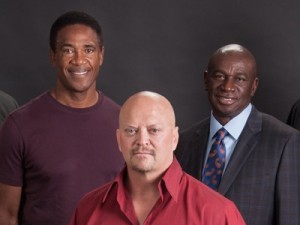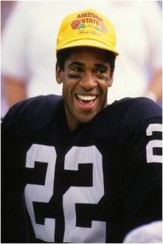Need Assistance? Call us today! 602-478-9713
Sleep Medicine to Improve Athletic Performance

NFL HOF Mike Haynes, ASBA CEO David Gergen, NFL Cardinals HOF Roy Green
National Football League (NFL) Hall of Famer Michael Haynes is arguably the best athlete that the NFL has ever seen. It’s high praise, considering that the league is filled with elite athletes. As a high school long jumper in 1971, he set a 23’ 5” school record that still stands. During the previous track season, Haynes nearly jumped over the landing pit, forcing groundskeepers to ultimately extend the sandy landing area.
During most of his stellar career, Haynes was fanatical about proper diet and exercise. Now 63 years old, Haynes, who played cornerback for the New England Patriots and the Los Angeles Raiders, admits that he never paid much attention to the value of good sleep. Why bother? His remarkable skills as a 6’3” “shutdown corner” with speed to burn suggested he was doing all the right things to take care of his health.
Haynes recalls one game day during his NFL rookie season in which a lack of sleep had an effect. “I had one incident where I ended up not sleeping at all,” confirms Haynes, who is also the national spokesperson for prostate cancer awareness. “And I did not feel super sharp. I knew that getting a good night’s sleep was important, but it’s really not until the last five years that I realized how important it is.”
After hearing David Gergen, CEO of the American Sleep & Breathing Academy (ASBA), speak on the topic of sleep apnea and oral appliances a few years ago, Haynes gained a new appreciation for the value of proper slumber. “David and Roy Green [retired NFL player] and a few other retired football players were talking about the importance of sleep, and I used to always think that sleep was overrated,” he says. “When I heard their speech, I started thinking, ‘maybe they’re right.’”
Using one of his sons’ computer brain games (Lumosity), Haynes confirmed that his mental sharpness was indeed better after a good night’s sleep. It may not have been a formal scientific test, but it helped to convince him that sleep truly mattered.
Enhancing Athletic Performance
In the fevered race to enhance athletic performance, addressing sleep apnea represents a potentially huge business niche, particularly for dentists who provide oral appliances. If Haynes had sleep apnea during his playing days, and we don’t know that he did, it is possible that his Hall of Fame level play could have been even better.
During Haynes’ playing days at Arizona State University, college football programs had curfews, but testing for sleep apnea was never considered. NFL physicians and athletic trainers were experts at treating injuries, but they too did not evaluate sleep at the clinical level during the 1970s, 80s, 90s, and in some cases, not even now.
And yet, times are changing. With the help of retired NFL athletes, an audience of potential patients (particularly men of a certain age who have been following football for a long time) are getting the message. The ASBA chatted with Haynes about his work with the ASBA, and his continued mission to educate athletes and the general public about overlooked health problems such as sleep apnea and early detection of prostate cancer.

NFL Hall of Fame CB Mike Haynes
ASBA: Does today’s athlete appreciate the value of sleep?
Michael Haynes: I know the awareness has a long way to go. At this point, I think we are barely scratching the surface. I was doing some work with the football team at my alma mater [Arizona State University] and trying to tell the guys that sleep is important. However, I also know that I was their age at one point.
ASBA: Did the staff at your alma mater know about sleep apnea?
Haynes: During a presentation, I saw this one guy nodding off all the time. After the meeting, I asked him, “How much sleep did you get last night?” He said, “I don’t know.” I asked him, “Do you know what sleep apnea is?” He did not know, and I went to go talk with the trainer. I asked the trainer if he tested players for sleep apnea. They did not test players, and I told him they should think about it. I said, “You have no idea how much better these guys could be.” Their concentration and physicality could be improved. I’m not sure if they did anything, but I do know that people don’t think of it.
ASBA: Do you think your message could resonate with other sports and other teams?
Haynes: I think that if players knew the importance of sleep, they would want to improve it. I think that they just don’t know. They think five or six hours of sleep is fine, and if they are on time, they are ok.
ASBA: Why do you think awareness is still low among athletes and coaches?
Haynes: I think it’s because the athletes still perform at a pretty high level. If they were running the 100 meters in say 10 flat, and then they did not get a good night’s sleep and they ran 10.5, well then of course they would know. But they are not making those comparison tests. At this point, they think they are ok [with the sleep they get]. With the computer mind games, I could determine with a raw number that good sleep made me sharper. And I did not know until I did the comparison, because I felt exactly the same way whether I got poor sleep or good sleep. And when I took the tests, it showed that I was not the same.
ASBA: What is the culture of the NFL when it comes to performance improvement for players?
Haynes: In the NFL, they are always trying to get better. But believe it or not, guys can be stubborn too, and they can get stuck in their ways. Every team should be testing for sleep apnea. Just imagine if a top QB had sleep apnea. How much better could he be if he is getting good sleep?
ASBA: How much is on the player to ask to be tested for sleep apnea?
Haynes: I think that a lot of it has to be self motivated. It’s not like the trainers are going to say, “I want you to get tested for sleep apnea,” especially if the athletes don’t have a performance concern.”
ASBA: Do you think that athletes are even more likely to have success with oral appliances since many of them are used to wearing mouthpieces for safety reasons?
Haynes: Yes, I do. They are used to it. They are used to putting them in, and having them in for a long time. The CPAP machine, I think, would be a little uncomfortable. From what I understand, they are noisy, and I can’t imagine moving around with that mask on. An oral appliance is an easier solution.
ASBA: The ASBA was recently in charge of sleep apnea screenings at the recent NFL Players’ Association meeting. How important are these types of health screenings for retired players and others?
Haynes: They are extremely important. You can learn a lot. At a screening for prostate cancer, I found out that I might be a candidate for the disease. The NFL launched its inaugural screening program at the Pro Football Hall of Fame during “Induction Weekend” in 2008. At the time, I was working in the league office. I was asked to go check out the screening and to report back on how it was going. While there, the phlebotomist convinced me to be screened too. They said, “Why don’t you participate in the screening? It may convince others to do the same.”
ASBA: What was the screening like?
Haynes: They drew blood samples and 20 to 30 minutes later the doctor called me in to talk about my results. He was very thorough and explained that my results are almost meaningless without comparing them to my other test. He said that early detection was the key to treating the disease successfully. I couldn’t answer any of his questions. I didn’t know if my general care physician was tracking my PSA, or if prostate cancer ran in my family, or how many men would be diagnosed with this disease. One in seven men will be diagnosed with the disease in their lifetime, although I had never heard of anyone getting it.
Hearing that more men would be diagnosed with prostate cancer than women would be with breast cancer got my attention. If I had the disease, I wanted to catch it in its early stages and I contacted my general care physician as soon as I got back home. It was then that I learned that my general care physician had been keeping track of my PSA. I gave him my most recent results, and noticing a radical increase in my PSA, he recommended that I see a urologist to make sure that nothing was going on. During my visit with the urologist, he told me that my doctor should have sent me to see him after my last physical. That conversation opened my eyes and I realized that even the medical community was not on the same page regarding when to send a patient for a biopsy.
ASBA: What were your results?
Haynes: My test results were positive. I had the disease. If not for being there, I might have found out that I had the disease in the latter stages when it’s a much tougher kind of fight.
ASBA: And are physicians also bad about asking patients about sleep?
Haynes: Yes. Primary care doctors should be asking patients: “How are you sleeping? Do you wake up at night? Does your wife complain about you snoring?” I have never had a doctor ask me those questions. If they started to ask those questions, education would spread. Awareness is getting better. Pro athletes, a lot of times, are leaders when it comes to health and wellness, so having this type of information helps. The screenings have been wonderful for football players. We are educating our friends, families, and community members. If I asked my neighbors what sleep apnea was, they probably would not know.
ASBA: Do you have sleep apnea?
Haynes: When they tested me, they said I had “slight” sleep apnea. And they were saying that I did not need an oral appliance, but I felt differently and said, “If it’s slight, that means I have it, so let’s look into getting me the oral appliance.” I would rather have no sleep apnea at all if I can. Why would it be ok to have it all? I still use that oral appliance.